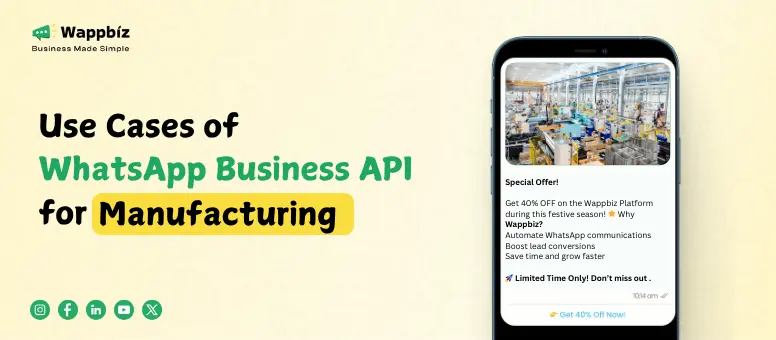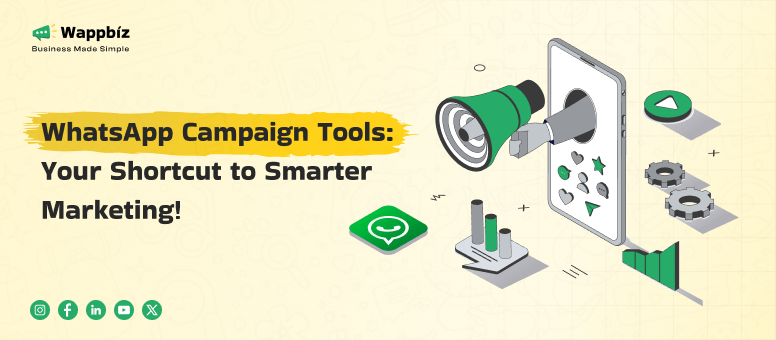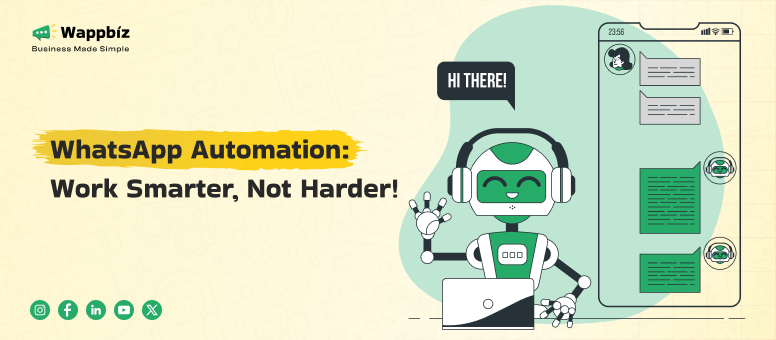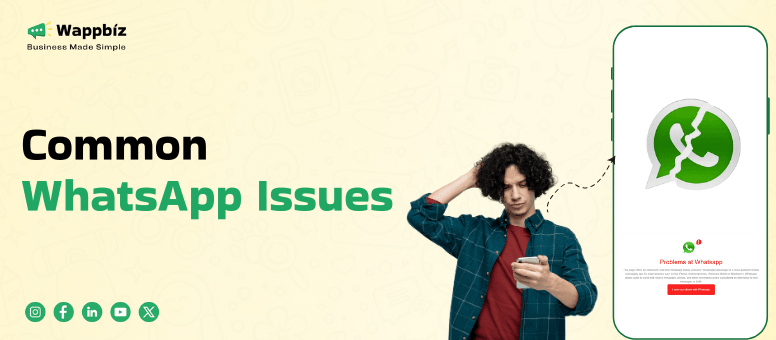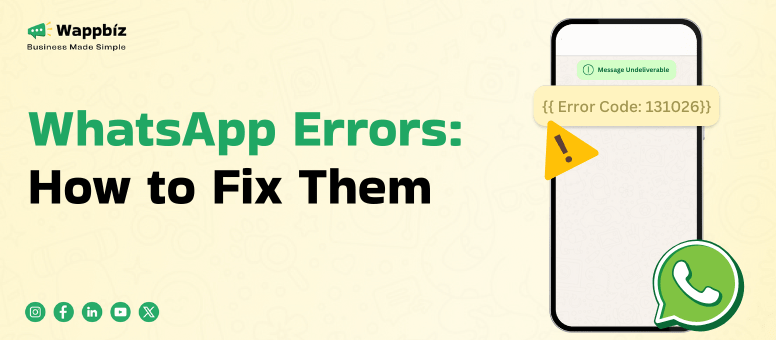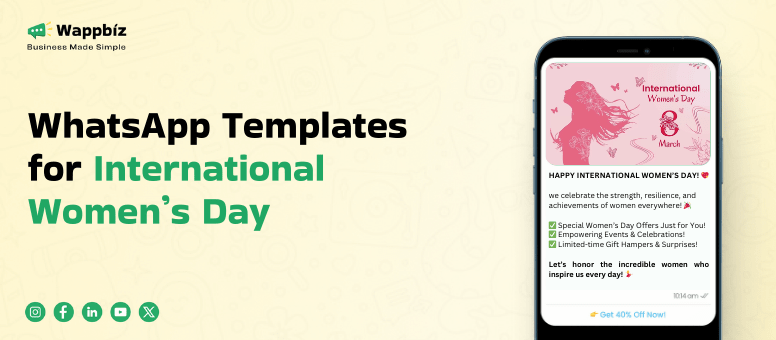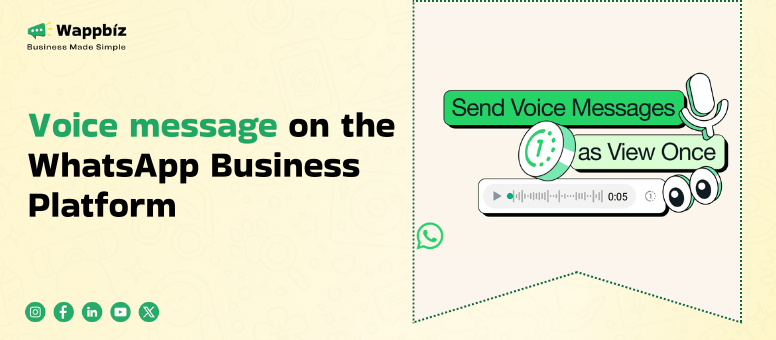Every second matters in manufacturing, and the difference between seamless communication can be a game changer. It is a real-world solution for manufacturers to stay in touch with suppliers, team members, and customers through the WhatsApp Business API. WhatsApp is revolutionizing industry efficiency, from sending stock alerts to quickly addressing production issues! Wappbiz enables manufacturers to integrate WhatsApp with ease, creating a mutually beneficial real-time link that enhances manufacturing quality, reduces response time, and fosters customer satisfaction.
Why is the WhatsApp Business API important for manufacturing and production?
Implementing the WhatsApp Business API for manufacturing and production would bring a few essential advantages to an industry where efficiency, communication, and real-time updates matter. Manufacturers can enhance their email automation process with WhatsApp automation and chatbots, making it easier than ever to manage inventory alerts, order inquiries, and internal team communication, thereby minimizing delays and ensuring optimal operational accuracy. Manufacturers can integrate with WhatsApp using tools such as Wappbiz, which enables faster deliveries and timely communication by automating responses and speeding up workflows, thereby enhancing the efficiency of the production line.

20 Use Cases of WhatsApp Business API for Manufacturing and Production
1. Real-Time Inventory Alerts
One of the critical aspects of manufacturing is managing inventory levels.
Example:
Imagine a scenario where a procurement manager receives this alert:
“Inventory Alert: The average stock of aluminum sheets has fallen below 10%. Do not delay in Production Line A; please reorder.”
The system instantly dispatches this message via WhatsApp, ensuring timely reordering and preventing the factory from incurring costly downtime due to insufficient material availability. Real-time alerts, which eliminate the need for manual stock checks, prevent supply chain disruptions, and ensure smooth production lines.
2. Production Schedule Updates
Production schedule adjustments are inevitable, but timely notifications can minimize disruption.
Example:
We send a message to the team members if maintenance disrupts the operation of Line B:
“Update: Line B Shift Update (Maintenance Delay by 2 hours). New start time: 3 PM. Please confirm receipt.”
The timely update allows all employees to talk at once, preventing confusion about which version you saw. This promotes collaboration and workflow efficiency.
3. Scheduling and reminders for maintenance
Scheduled maintenance helps keep some equipment in excellent working order, limiting the threat of unexpected breakdowns.
Example:
The maintenance team receives the following information prior to a key inspection:
“Reminder: Scheduled maintenance for Conveyor Belt 2 tomorrow at 10 AM. Checklist: Lubrication, belt tension, and sensor alignment.”
These reminders help make sure the team gets the preparation it needs, so less downtime occurs (and less costly emergency repair work). Maintenance through WhatsApp is reliable and seamless.
4. Supplier Coordination
Suppliers form the backbone of production, which is why seamless communication is paramount.
Example:
When a steel shipment is delayed, the procurement team posts:
“Please confirm the delivery status of Order #4567. Production requires the material by Friday to avoid any delays in the process.”
The supplier’s immediate reaction guarantees timely adjustments to the production plan. This instant communication fosters strong supplier relationships and helps avoid delays in the supply chain.
5. Shipment Tracking and Notifications
Let your customers know what the status of their orders is, and it will help build trust.
Example:
If a batch of goods is shipped, the customer will be receiving:
“We have shipped your order #12345. Track it here: [Link]. Estimated delivery: Oct 15.”
Immediate notification reduces follow-up inquiries and adds transparency, boosting customer satisfaction while helping the logistics team stay on top of deliveries.
6. Quality assurance and reporting
Manufacturers can never compromise on quality standards.
Example:
If a batch fails a durability test, the quality control team sends this message:
“QC Alert: Batch 234 failed tensile strength tests. Recommend stopping the production to review the materials.”
Simultaneously, managers can attain a high level of efficiency, guaranteeing quality and reducing waste by promptly rectifying any technical defect detected immediately. Automated reminders for routine checks further improve quality assurance practices.
7. Safety Protocol Updates
Manufacturing firms even use WhatsApp to alert staff about any safety issues, as safety is always the number one priority in any firm.
Example:
“Safety Update: Starting Monday, it will be mandatory for all staff to wear high-visibility vests within the assembly area. Please pick yours from H.R.”
Real-time updates encourage compliance and make a workplace safer. The group messaging feature of WhatsApp means nobody misses out.
8. Order Confirmation and Status Updates
Using transparency in the order processing builds strong relationships with the clients.
Example:
In the case of a bulk order, the client receives the following benefits:
“Order Confirmed: Your 10,000-unit order is in production; expected delivery: 1st Nov. We will update you regularly.”
Regular correspondence keeps clients in the loop, alleviates anxiety, and indicates professionalism, further promoting faith in the manufacturer.
9. Employee Shift Notifications
The response to fluctuating demand requires real-time communication with its staff members.
Example:
When order volumes spike, HR sends this message:
“Urgent: Extra shift required for Line A tomorrow, 6 PM to 10 PM. Reply ‘YES’ if available.”
Real-time alerts allow for optimal staffing, enabling manufacturers to quickly react to changing production demands.
10. Customer Inquiry Handling
WhatsApp chatbots can help automate routine customer inquiries.
Example:
When a client asks:
“What’s the status of Order #56789 in production?”
The chatbot replies:
Order #56789 is 60% complete and on track for delivery on October 20. Track progress: [Link].”
This automates customer service loads and makes sure clients get updates in time, enhancing satisfaction.
11. Production line status in real time
Teams stay up to date on production progress, which reduces delays.
Example:
If Line C meets its daily target, it will send a message:
“Good news: Line C has exceeded today’s output target by 10%. Keep up the excellent work!”
Keeping teams motivated with milestone celebrations and notifying them at the earliest possible time about any delays or issues leads to rectification.
12. Automatic invoices and payment reminders
Sending invoices promptly is a cash flow booster.
Example:
Customers receive:
“Invoice #7890: Amount due $15,000. Payment deadline: Oct 30. Pay here: [Link].”
This takes the complexity out of the billing process while giving clients clear, actionable reminders that lead to fewer payment delays.
13. Delivery Confirmation Messages
Manufacturers can close the loop with instant confirmations upon delivery of goods.
Example:
“Delivery Confirmation: Order #98765 delivered to [Customer Name] on Oct 10. Details: [Link].”
This means that customers have to be fully informed and reassured, which also helps limit disputes while increasing trust.
14. Equipment Usage Tracking
Data on the utilization of equipment allows for performance optimization.
Example:
“Weekly Equipment Report: Machine A ran for 48 hours at 95% efficiency. Maintenance check due next week.”
With these updates, managers will be able to proactively schedule maintenance to extend the life of the equipment and improve business efficiency.
15. Training employees and sharing resources
We are using WhatsApp to simplify the distribution of training materials.
Example:
“Training Material (Your new packaging machine operation): You can learn how to operate the new packaging machine at [Link]. You must finish it by October 20.”
That gives employees access to the resources they need to be the very best they can be and instills continuous learning and best practices.
16. Vendor Payment Status Updates
Informing suppliers about payments helps maintain relationships.
Example:
“Payment Update: Invoice #4567 for $8,000 processed on Oct 5. Expected clearance: Oct 8.”
This transparency fosters trust and keeps vendors vigilant, thereby facilitating a more responsive supply chain.
17. Stock-level management with alerts
Low stock alerts prevent production halts.
Example:
“STOCK ALERT: The stock of plastic resin is at 15%. We require your immediate reorder to prevent any disruption on Line D.”
These real-time notifications enable procurement teams to act swiftly, reducing the risk of production delays.
18. Incident Reporting and Emergency Alerts
Timely incident reporting reduces risks.
Example:
“Emergency Alert: Hydraulic press malfunction detected. Maintenance and safety teams notified. Area secured.”
WhatsApp provides the fastest way to communicate during life-and-death situations to ensure employees are in a safe area and reduces downtime.
19. Personalized Order Tracking for B2B Clients
Bigger clients like to know all the details of their orders.
Example:
“Order Update: Your batch of 20,000 screws is in production. Expected shipping: Nov 5. Track here: [Link].”
Such personalized communication allows building trust and minimizes the need for follow-ups, improving the client experience greatly.
20. Updates to the Production Forecasts
Sharing its demand forecast can create common production goals across the different companies.
Example:
“Production Forecast: Demand for Product X is expected to increase by 30% next quarter. Prepare for additional shifts.”
Such updates ensure all stakeholders are aware and prepared in advance, which goes a long way toward better planning and resource allocation.
Conclusion
Manufacturing and production-dependent businesses can utilize the WhatsApp Business API as a powerful component of their communication and automation arsenal, enabling these organizations to run efficiently at every level. Whether it is inventory or quality control, WhatsApp simplifies and accelerates processes. Wappbiz helps you to integrate WhatsApp with your manufacturing so that you can enhance your routine workflows and communication and increase production.
Do you want to elevate your manufacturing communication to the next level? With Wappbiz, you can enhance your efficiency in real time and without any hassle, as it seamlessly integrates WhatsApp into your workflow.

FAQs
How can manufacturing and production companies use the WhatsApp Business API?
For manufacturers, the WhatsApp Business API can facilitate seamless communication with suppliers, clients, and team members to keep everything moving in an efficient and timely manner.
Does the WhatsApp Business API assist in improving supplier coordination for manufacturing?
Absolutely! Manufacturers benefit from real-time inventory updates, delivery tracking, and order confirmations with suppliers using the WhatsApp Business API.
Can the WhatsApp Business API help track orders and shipments?
Definitely! The platform allows for the transmission of real-time tracking updates and delivery confirmations, keeping customers informed throughout the process; manufacturers can utilize WhatsApp for this purpose.
Is WhatsApp a secure platform for business information pertaining to manufacturing?
Yes. The WhatsApp Business API uses end-to-end encryption, meaning that any data exchanged between suppliers, clients, and team members is secure and confidential.
How can manufacturing companies use the WhatsApp Business API for feedback collection?
Manufacturers can also use WhatsApp to ask their customers about the quality of their products and services, thereby increasing business.
Does WhatsApp help with introducing new products or innovations in manufacturing?
Absolutely! WhatsApp is useful for keeping the clients engaged with updates on new launches, impressive features, and the latest technology introduced by the manufacturer.

